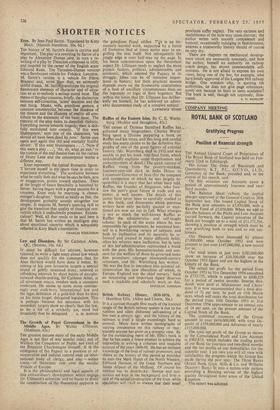British Railway History, 1830-1876. By Hamilton Ellis. .(Allen and Unwin,
30s.) IT is a curious thought how much of the knotted tangle of the British railway system is due to the, ruthless and often dishonest self-seeking of a few men a century ago; and the history of the railways is itself a tangle exceedingly hard to unravel. Many have written monographs of varying competence on this railway or that; 'scarcely anyone has given us a synoptic view. By far the outstanding merit of Mr. Ellis's book is that he has made a brave attempt to achieve the impossible in writing a coherent and readable • account of the years 1848-60. He has an intimate knowledge of the lives of railway promoters, and shows us the history of this period as moulded by snen like Mark Huish• of the North Western, Edmund Denison of the Great Northern and James Allport of the Midland. Of course his method has its drawb.s:ks: finance and eco. nomics are kept in the background and little is said of the actual construction of the lines. while specialists wilt cavil sic always that their small provinces suffer neglect. The very raciness and readableness of the style may cause distrust; the author writes with smooth competence and humour, occasionally indulging in facetiousness, whereas a trustworthy history should of course be very dry.
There are chapters on mechanical develop- ment which are necessarily summary, and here the author, himself an authority on railway coach design, has shown commendable self- restraint. He is not afraid to express his own views, being one of the few, for example, who have,boldly approved of the Ludgate Hill railway bridge. One wonders why, in quoting his authorities, he does not give page references; surely mot because he fears to seem academic? The book is well, though not copiously, illus-










































 Previous page
Previous page